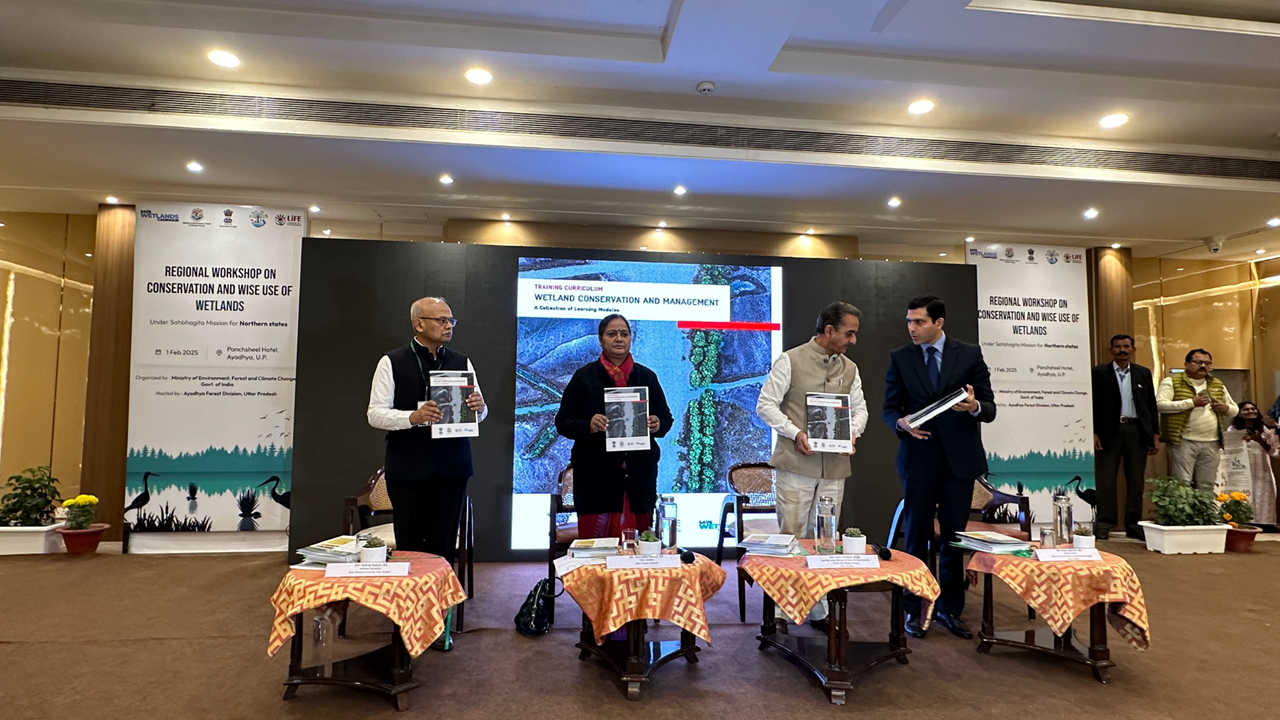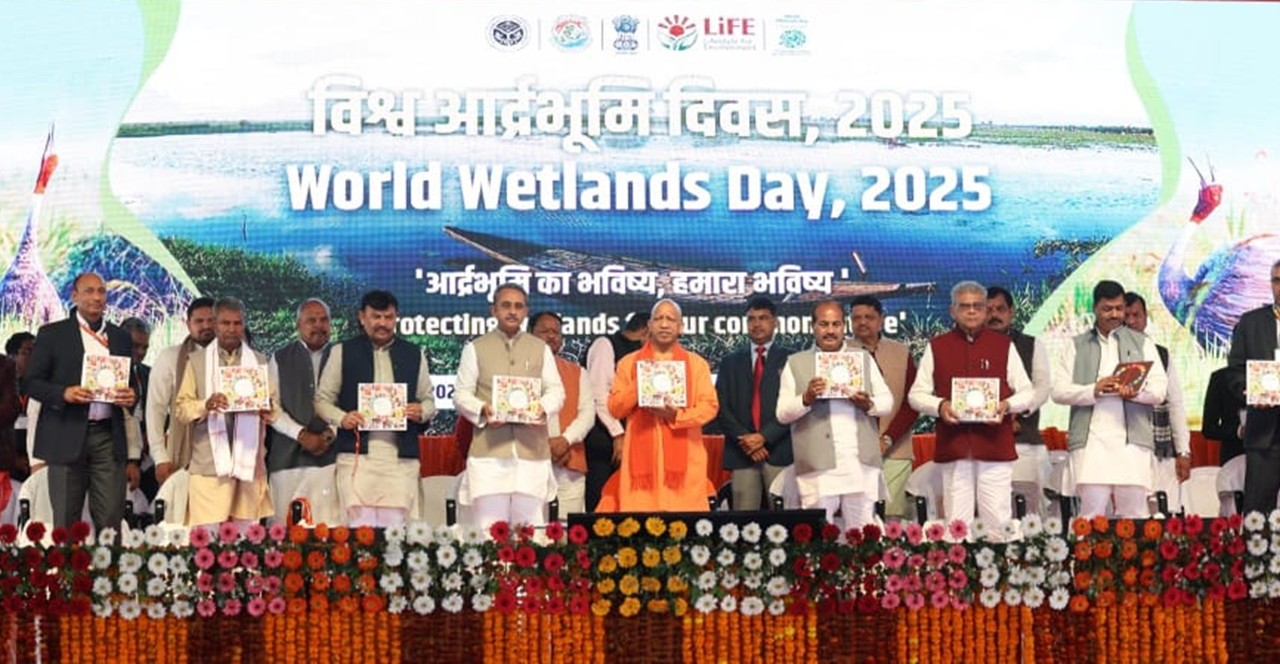02 Feb, 2025
Every year, on 2nd February, we observe World Wetlands Day to highlight the importance of wetlands, one of Earth’s most vital yet often overlooked ecosystems. Wetlands support biodiversity, regulate climate, and sustain millions of livelihoods.
A report from Ramsar Convention reveals that over 35% of the world's wetlands have been lost since 1970, which makes them one of the most threatened ecosystems, disappearing three times faster than forests. Recognising their critical role, India’s National Biodiversity Strategy and Action Plan 2030 prioritises wetland conservation. This year’s theme, "Protecting Wetlands for Our Common Future," highlights the urgent need to safeguard these ecosystems for both nature and people.
A Global Call for Action
“Life thrives in wetlands, and human life depends on them,” says Dr Musonda Mumba, Secretary General of the Convention on Wetlands. “Beyond the clean water and food that wetlands provide, they help protect against natural disasters by mitigating the impact of storm surges, floods and droughts.”
World Wetlands Day 2025 carries special significance because it shares its theme with the upcoming 15th Conference of the Contracting Parties to the Convention on Wetlands (COP15) in Victoria Falls, Zimbabwe (July 2025). Every three years, global representatives meet to shape wetland conservation policies for the years ahead.
India’s Commitment to Wetland Conservation
India, home to 85 Ramsar Sites, has made significant strides in wetland conservation. This year, the IKI-BMUV Wetlands Management for Biodiversity and Climate Protection project actively participated in national celebrations at the Parvati Arga Bird Sanctuary, a Ramsar Site in Gonda, Uttar Pradesh. The event, inaugurated by Chief Minister Shri Yogi Adityanath and Minister of State for Environment, Forest and Climate Change Shri Kirti Vardhan Singh, highlighted India’s efforts in sustainable wetland management, community-driven conservation, and policy advocacy.
As a trusted knowledge partner of the Ministry of Environment, Forest and Climate Change (MoEF&CC), the project showcased its contributions to wetland conservation, including:
Two grassroots organisations supported by the project promoted water-hyacinth-based products, engaging over 300 women entrepreneurs in eco-friendly livelihoods.
Regional Action for Wetlands
Beyond national-level initiatives, state governments and local stakeholders are taking proactive steps to protect wetlands. Ahead of World Wetlands Day 2025, a Regional Workshop under Mission Sahbhagita brought together State Wetland Authorities and civil society from seven northern states to discuss innovative conservation approaches. Shri Kirti Vardhan Singh, Minister of State for External Affairs and Environment, Forest and Climate Change, highlighted the importance of collaborative efforts across all levels of governance. Meanwhile, in Bihar, dialogues between wetland mitras and state authorities engaged over 200 participants, emphasising the power of community-driven wetland conservation.
New Publications Released:
As part of the celebrations, several key publications developed with technical support from the project were launched, including:
These publications provide scientific insights, policy recommendations, and community engagement tools, helping bridge the gap between knowledge and action.
How You Can Help Protect Wetlands:
On the statement for World Wetlands Day 2025, Secretary General of the Convention on Wetlands Dr Mumba urges everyone to take action:
Small actions like reducing waste, supporting sustainable agriculture, and raising awareness can make a big difference.
 Launch of Training Curriculum | © GIZ India
Launch of Training Curriculum | © GIZ India
 Launch of Saat Kadam Poster | © GIZ India
Launch of Saat Kadam Poster | © GIZ India
 World Wetland Day Celebrations at the Parvati Arga Bird Sanctuary, a Ramsar Site in Gonda, Uttar Pradesh | © UPSWA
World Wetland Day Celebrations at the Parvati Arga Bird Sanctuary, a Ramsar Site in Gonda, Uttar Pradesh | © UPSWA
*
The Wetlands Management for Biodiversity and Climate Protection project aims to strengthen the institutional framework and capacities for an ecosystem-based integrated management of wetlands of international importance (Ramsar sites) in India. The project is implemented by the Deutsche Gesellschaft für Internationale Zusammenarbeit (GIZ) GmbH on behalf of the German Federal Ministry for the Environment, Nature Conservation, Nuclear Safety and Consumer Protection (BMUV) in partnership with the Ministry of Environment, Forest and Climate Change (MoEFCC) in close cooperation with the National Plan for Conservation of Aquatic Ecosystems (NPCA). This project is part of the International Climate Initiative (IKI). The Federal Ministry for the Environment, Nature Conservation, Nuclear Safety and Consumer Protection (BMUV) supports this initiative on the basis of a decision adopted by the German Bundestag. Read More
For more information contact: biodiv.india@giz.de
© 2014 IGBP. All Rights Reserved.
Site By: Virtualpages
